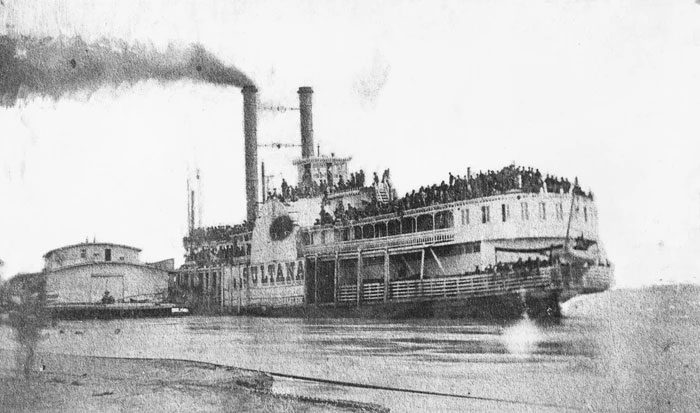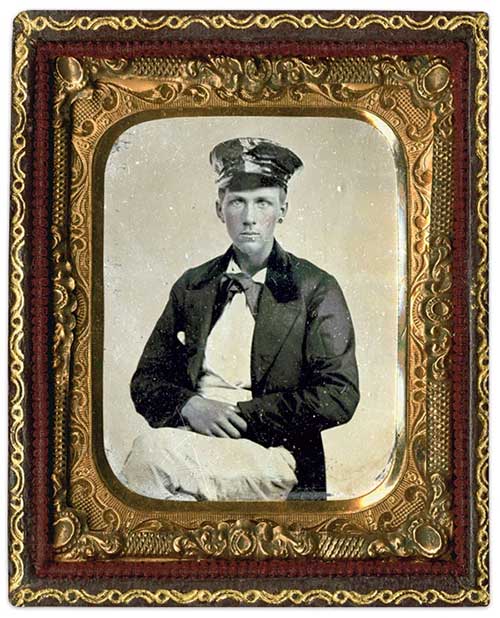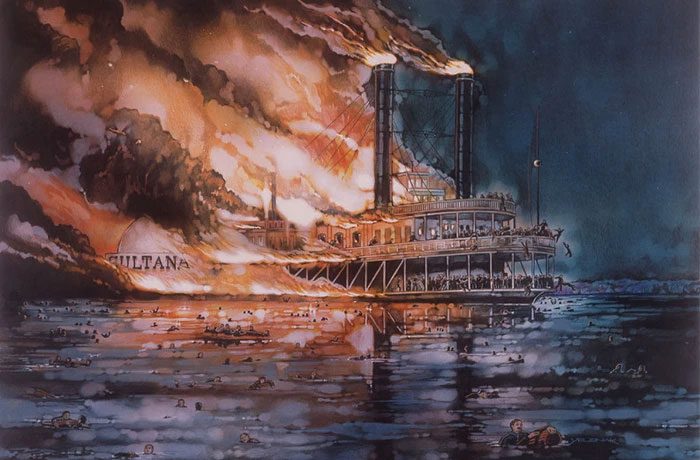The catastrophic sinking of the Sultana in 1865 is considered even worse than the Titanic disaster.
When discussing maritime disasters in history, the tragedy of the legendary Titanic is often mentioned due to its sorrow and brutality. However, few know that prior to the construction and sinking of the Titanic, the sinking of the Sultana was regarded as the “American version of the Titanic.”

The horrifying tragedy that led to the Sultana being called the “American version of the Titanic.”
In 1865, following the end of the Civil War, thousands of Union soldiers were granted amnesty. Most of these soldiers were held in prisons in Cahaba, Alabama, and Andersonville, Georgia, and they were to be transported to a small holding camp on the outskirts of Vicksburg, Mississippi, before heading north up the river.
The Overcrowded Vessel
At that time, Captain James Cass Mason, who commanded the steamship Sultana with a crew of 85, was en route to Missouri to transport cotton. However, during a stop in Vicksburg for boiler repairs, Captain Mason received word that the U.S. government was willing to pay $5 for each soldier and $10 for each officer to transport former Union prisoners back north.

Captain James Cass Mason.
Tempted and blinded by greed, the captain seized the opportunity and accepted bribes from an officer to transport as many prisoners as possible. He feared that if he waited for the boiler to be fully repaired, the soldiers would find another ship. Therefore, Captain Mason made only temporary repairs to the boiler of the vessel to quickly execute his plan to “cash in.”
Not taking much time to repair the vessel, on April 24, 1865, the Sultana set sail from Vicksburg heading north. Despite the ship’s legal capacity being only 376 passengers, the captain overloaded it with 2,500 people, including approximately 1,960 prisoners, 22 officers, 70 paying passengers in private cabins, and 85 crew members. The number of passengers exceeded the allowable limit by a hundred times, causing the ship to be overcrowded.
The Tragedy Strikes
In addition to the hasty repairs to the boiler and the overcrowding, Captain Mason made another bold decision to set sail in poor weather conditions. It was reported that on that day, the Mississippi River was turbulent, with many logs and debris floating on the surface, making the ship even harder to navigate as night fell.
After a brief stop in Memphis, Tennessee, they continued their journey that night. Around 2 AM on April 27, just a few miles after leaving Memphis, one of the Sultana’s boilers suddenly exploded, killing hundreds of soldiers instantly due to shrapnel, burns from steam, and scalding water that spewed from the boiler.

The boiler explosion caused chaos on the ship.
The soldiers on the Sultana, who had just survived the bloody Civil War and the horrific conditions of imprisonment, now faced another painful blow.
“When I regained consciousness, I found myself… surrounded by debris, amidst smoke and flames. The cries of the injured were heart-wrenching, everything was beyond my capacity to endure and beyond my ability to describe.” – a survivor of the tragedy recounted.
However, shortly afterward, two more boilers on the ship also exploded, plunging the Sultana into chaos. Amidst the tragedy, the surviving passengers had to make a choice: stay on the ship and possibly burn to death, or jump into the dark waters.
Describing the chaotic scene on the Sultana, historian Gene Salecker Potter wrote: “Just a minute before, they were sound asleep, then the next moment they found themselves floundering in the icy Mississippi.”

The ship sinking after the boiler explosion, taking many lives.
The explosion severely damaged the ship, causing it to begin sinking below the water. Despite rescue efforts from passing boats and local residents, the heavy damage caused the ship to tilt, leading to the deaths of approximately 1,700 people on board, including Captain Mason, within just a few hours.
However, the figure of 1,700 fatalities is believed to be an estimate, and in reality, the number could be much higher. Though not as famous as the Titanic, this incident is still considered one of the most catastrophic maritime disasters in history, leaving many heartbroken whenever they reflect on it.





















































